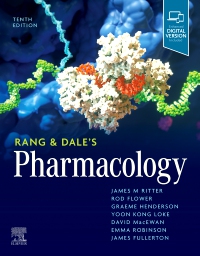
Rang & Dale's Pharmacology, 10th Edition
Paperback

Now in its tenth edition, it has been updated to include important new drugs such as gene therapies, personalised medicines and the new wave of RNA drugs. However it has not lost any of the elements that have contributed to its popularity, such as color coding and illustrations, making it reader-friendly while comprehensively covering the depth of detail required.
This essential book is recommended as the first-choice undergraduate text for science and medical students and junior doctors and will also be useful for students in other professional disciplines such as pharmacy, veterinary medicine and nursing.
-
- Comprehensive information on drug mechanisms, basic physiology and biochemistry, and underlying pathophysiology of disease – suitable for students from many disciplines
- Clear figures to aid understanding, including data figures as well as mechanistic diagrams,
- Key points box summaries, clinical boxes and colour-coded chapters help to master difficult concepts
- Emphasis on therapeutic drugs to help apply theory to practice
- Over 150 questions and 12 clinical cases to test your knowledge
- An enhanced eBook version is included with purchase. The eBook allows you to access all the text, figures and references, with the ability to search, customise your content, make notes and highlights, and have content read aloud
-
SECTION 1 GENERAL PRINCIPLES
1. What is pharmacology?
2. How drugs act: general principles
3. How drugs act: molecular aspects
4. How drugs act: cellular aspects - excitation, contraction and secretion
5. How drugs act: Biopharmaceuticals and gene therapy
6. Cell proliferation, apoptosis, repair and regeneration
7. Cellular mechanisms: host defence
8. Method and measurement in pharmacology
9. Absorption and distribution of drugs
10. Drug metabolism and elimination
11. Pharmacokinetics
12. Individual variation, pharmacogenomics and personalised medicine
SECTION 2 CHEMICAL MEDIATORS
13. Chemical mediators and the autonomic nervous system
14. Cholinergic transmission
15. Noradrenergic transmission
16. 5-Hydroxytryptamine and purines
17. Local hormones: histamine, lipids, peptides and proteins
18. Cannabinoids
19. Nitric oxide and related mediators
SECTION 3 DRUGS AFFECTING MAJOR ORGAN SYSTEMS
20. The heart
21. The vascular system
22. Atherosclerosis and lipoprotein metabolism
23. Haemostasis and thrombosis
24. Haemopoietic system and treatment of anaemia
25. Anti-inflammatory and immunosuppressant drugs
26. Skin
27. Eye
28. Respiratory system
29. The kidney and urinary system
30. The gastrointestinal tract
31. The control of blood glucose and drug treatment of diabetes mellitus
32. Obesity
33. The pituitary and the adrenal cortex
34. Thyroid
35. The reproductive system
36. Bone metabolism
SECTION 4 NERVOUS SYSTEM
37. Chemical transmission and drug action in the central nervous system
38. Amino acid transmitters
39. Other transmitters and modulators
40. Neurodegenerative diseases
41. General anaesthetic agents
42. Headache
43. Analgesic drugs
44. Local anaesthetics and other drugs affecting sodium channels
45. Anxiolytic and hypnotic drugs
46. Antiepileptic drugs
47. Antipsychotic drugs
48. Antidepressant drugs
49. Psychoactive drugs
50. Drug use and addiction
SECTION 5 DRUGS USED FOR THE TREATMENT OF INFECTIONS AND CANCER
51. Basic principles of antimicrobial chemotherapy
52. Antibacterial drugs
53. Antiviral drugs
54. Antifungal drugs
55. Antiprotozoal drugs
56. Antihelminthic drugs
57. Anticancer drugs
SECTION 6 SPECIAL TOPICS
58. Harmful effects of drugs
59. Lifestyle drugs and drugs in sport
60. Drug discovery and development

 as described in our
as described in our 